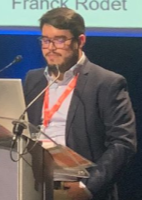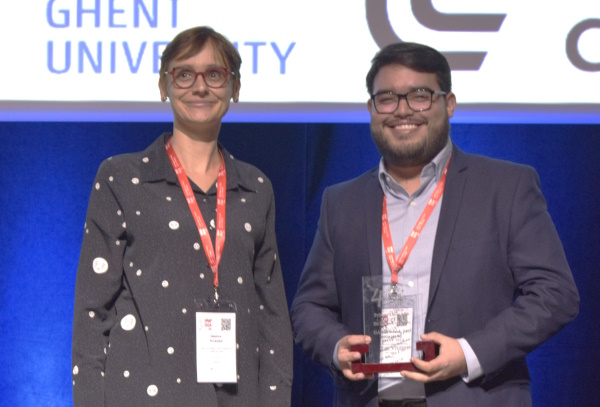
Le prix de thèse 2024 de la FPS est décerné à Diego Fernando Garcia-del Rio pour ses travaux sur le Ghost proteome à travers l'étude de complexes protéiques. Ces travaux ont été réalisés dans les laboratoires de PRISM à Lille et à l'Université de Gant en Belgique, sous la codirection d'Amélie Bonnefond, Michel Salzet et Kris Gevaert.

I would also like to extend my heartfelt gratitude to the French Proteomics Society (FPS), its Scientific Committee and Board for awarding me the 2024 Thesis prize. Additionally, I would like to thank all the supervisors of my thesis: Michel Salzet (U. Lille), Amélie Bonnefond (U. Lille), Kris Gevaert, Sven Eyckerman (U. Ghent), and Tristán Cardon (U. Lille). Your unwavering support, guidance, and expertise were instrumental in shaping my research journey. To my committee members and fellow researchers who offered their time, knowledge, and constructive feedback: your contributions have been pivotal in bringing my work to completion.
My work studies ovarian cancer (OvCa), the deadliest female reproductive cancer, which is often diagnosed late due to its stealthy nature. Current treatments face challenges like chemotherapy resistance, necessitating new therapeutic strategies.
In this context, the ghost proteome is a potentially rich source of biomarkers. The ghost proteome, also known as the alternative proteome, consists of proteins translated from alternative open reading frames (AltORFs). These AltORFs originate from different start codons within mRNA molecules, such as the coding DNA sequence (CDS) in frameshifts (+1, +2), the 5'-UTR, 3'-UTR, and possible translation products from non-coding RNAs (ncRNA).
Studies on alternative proteins (AltProts) are often limited due to their case-by-case occurrence and complexity. Obtaining functional protein information for AltProts requires complex and costly biomolecular studies. However, their functions can be inferred by profiling their interaction partners, known as "guilty by association" approaches. We developed a methodology combining crosslinking mass spectrometry (XL-MS) and subcellular fractionation to study AltProts. This approach, along with molecular modeling and network analysis, revealed potential roles for AltProts in cellular processes.
A proteogenomic analysis compared ovarian cancer cell lines (PEO-4 and SKOV-3) with a normal ovarian epithelial cell line (T1074). Using RNA-seq data and customized transcriptomic-derived protein databases, we identified differentially expressed proteins, including AltProts, and associated some with cancer-related pathways.
This work demonstrates proteogenomics' potential in uncovering new aspects of ovarian cancer biology, identifying unknown proteins and variants with possible functional significance. Our approach sheds light on the previously unexplored "ghost proteome."
Finally, I thank the FPS for providing me support to attend SMAP 2024 in which the collaborative spirit and intellectual stimulation provided by the FPS community have been invaluable to my growth as a researcher.
Diego Fernando Garcia-del Rio



